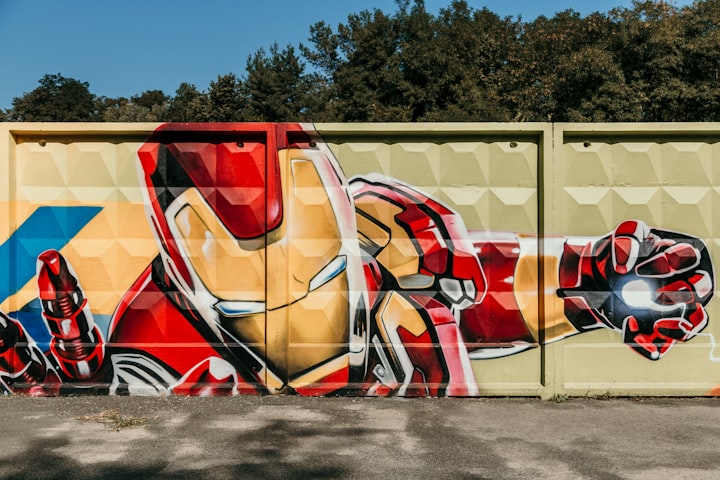Blood, Sweat, and Tears
An Examination of Superhero Humanity and the Impact of its Portrayal in Society

Superheroes seem to cry a lot nowadays, don’t they?
How refreshing is that, right?
No, I’m not being sarcastic; I am actually thrilled with the trend of superheroes (and super-powered characters in general) showing more vulnerability in media lately. When they get hurt, you can see the pain in their eyes. When they’re lonely, sad, unsure, they don’t always approach those situations with the stiff upper lip they used to. This seems like a new trend, but…is it, really? Or have we, as the audience, just been given permission to let our heroes’ weaker moments sit with us longer?
The basis for today’s article is one of my favorite theories in the field of communication: Cultivation Theory. Gifted to the public by George Gerbner in the 1960s, the idea is that consumer understanding of the outside world is influenced, at least partially, by what we see on television, in movies, in video games etc. Gerbner used the phrases “light television viewers” and “heavy television viewers” to differentiate who feels the strongest effects of that influence. Nowadays, with few exceptions, I think we can do away with “light” versus “heavy.” We all carry a mini supercomputer in our pockets. As of now, the playing field in that regard has never been more level; however, the bones of Gerbner’s theory are stronger than ever. How many times have you heard someone justify an argument with “I read an article online?”
It stands to reason, and indeed it’s been proven through children, that Cultivation Theory can be tied very closely to how we look at superheroes and comic culture. In 1954, predating the theory’s introduction, Fredrick Wertham postulated that children being housed in a psychiatric ward had been, and would continue to be, driven to madness by the comics they were exposed to. He was so enraged that he published Seduction of the Innocent; a book publishing companies, writers, and even artists looked to for guidance on how to prevent such delinquency.
-------
By the way, Wertham’s postulation and his book are, in my opinion, nothing more than an attempt to push his own ideals. Wonder Woman was made subservient to Steve Trevor, interracial relationships couldn’t happen, Batman and Robin were given love interests because…exactly the reason you’re thinking. It was a whole mess. If you want a deeper dive into his ramblings, I highly suggest looking up Pandared’s channel on YouTube. He gives Wertham way more attention than I’m going to.
--------
“Mick, you JUST said Cultivation Theory has been proven in children; then you showed an example where it was DISPROVEN!”
I know, I know. Wertham’s only in there to show the viability of the theory. It worked on HIM, not the kids.
Signs of Cultivation Theory’s effect on children are a lot more innocent. Think about how much superhero merchandise is out there for kids. Six Flags makes a KILLING on the DC brand. Kids see their favorite heroes as being real parts of the world; so much so that ordinary people become superheroes too! Firefighters, doctors, Mom and Dad! If Superman can leap tall buildings in a single bound, surely Dad can! Captain Marvel can fly into space! Mom must have that power! She’s probably just keeping it a secret.
As they grow, that 1:1 comparison starts to taper off while the base language stays the same. We call those we admire “our heroes.” Whether we’re aware of it or not, the media we consumed when we were little has informed us of the traits we should be looking up to.
The first instance I can recall of seeing a superhero cry was Richard Donner’s first Superman film. Most of the run time is what you’d expect to see. Clark lands in Smallville, the Kents take him in, the power of our yellow sun makes him a god among mortals, and he moves to Metropolis, taking a job as a mild-mannered reporter. Lois Lane is introduced with one of the best first lines for a character in film history (I’m not telling you what it is, watch the film), and Lex Luthor quickly enters the narrative as our resident baddy.
And Ned Beaty is there too.
Not his best work.
SPOILERS FOR RICHARD DONNER’S SUPERMAN
Anyway! The big moment comes toward the end of the climax when Lois, as is standard for her character, becomes caught in the middle of Superman’s battle with Lex. In a dark twist, Clark is actually too late to save her. She’s crushed in a landslide. By the time he gets there, she’s already dead. Clark’s face contorts, not in rage first but in heartbreak. We’re given a few seconds to see the Man of Steel cry before he gathers himself enough to fix the situation; and even THAT’S done out of pain more than obligation. He’s still crying when he flies up to reverse time.
What Donner does so brilliantly in this sequence is show that even the unbreakable can break. Under the cape and the muscles, Clark is still human in that he can still feel. He’s not a robot like the Terminator, he’s not “too tough” to let his feelings out. He’s flesh and blood. This telegraphs to the audience that it’s natural to cry. It’s natural to feel helpless at times. The real strength is the strength to be that overwhelmed and still keep moving forward. Analyze the situation, take time to let it impact you, then do something about it.
Not to be outdone, the early Batman films and the animated series gave Bruce Wayne humanity as well. While Keaton never has a big crying scene like Christopher Reeve did, he isn’t always stone-faced. He gets annoyed, frustrated, he even gets flustered when a woman he has feelings for shows him the attention he craves. I’m not sure why the decision was made to strip those moments of awkwardness away from Kilmer and Clooney, given that their films are so bright and loud that their lack of emotion actually seems out of place.
Then, there’s the massive step backward when it comes to Christian Bale. HEAR ME OUT!
He’s a fine Batman. He’s a…decent Bruce Wayne. The way the character was written drives me up a friggen wall! When he’s supposed to be middle-of-the-road charming, he’s okay. He’s not a jerk (most of the time), he’s not insufferable, the problem is he isn’t anything except when he’s over-the-top evasive.
SPOILERS FOR THE DARK KNIGHT
The death of Rachel Dawes SHOULD HAVE BEEN a big moment for him. It wasn’t. He sits in his living room, still in his Batman costume, and tearlessly broods; then it’s right back to business. This was a woman he loved, a woman he would have given up being Batman for, and not a single tear is shed. Meanwhile Harvey, the character we’re not supposed to root for, won my sympathy instantly because we’re allowed to see him grieve! We can connect with his physical and emotional agony. No wonder Rachel chose him! Can you imagine THIS Bruce Wayne comforting you after a bad day?!
Thankfully, after the Dark Knight trilogy ended, we got a better Batman AND a better Bruce Wayne with Ben Affleck; who’s introduced into the comic world protecting a small child during Superman’s battle with Zod in Man of Steel. This Bruce knows how to separate his alter ego from his super persona. That little girl doesn’t need Batman right now. Her world is falling apart, her parents are missing, she NEEDS Bruce Wayne to hold her and assure her that she’ll make it through. I’ll forever be disappointed that Batfleck will never be given a Robin. His version of the character would have been pitch-perfect in the Bat family.
While it took a while for DC to get back to letting superheroes be people first and godlike beings second, Marvel was crafting the MCU on that very premise. The first Iron Man opens with Tony nearly being killed. We’re shown the man before we’re shown the machine; and he keeps his humanity throughout his next two solo movies. His flaws, self-doubt, high moments, low moments, and even his selfish tendencies are interwoven into the tapestry of his evolution. That’s why….shoot, hang on.
SPOILERS FOR ENDGAME, YES SERIOUSLY, SKIP THIS SECTION IF YOU DON’T WANT TO KNOW!
—————————————
That’s why it’s so heartbreaking when he dies. We’ve have years to see him laugh, see him cry. We’ve been at Tony’s side while he struggles to become the savior of the human race. He even has a daughter that he tucks into bed at night! They eat juice pops together and he tells her stories! We don’t want him to go!
—————————————
OKAY SPOILERS OVER, YOU’RE SAFE
Marvel has brought their penchant for showing the cracks in the armor from the big screen to the small screen recently; with three original series currently streaming on Disney+ and plenty more on the way. At no time do the show runners avoid showing how damaged these characters are. So what if they don’t always look tough?! They’ve been through Hell! They’re still heroes!
So far, WandaVision, Falcon and the Winter Soldier, and Loki have blessed us with moments where the leads experience profound relief or profound horror. Whether it’s a death that occurred in a previous film, a lifetime of torture finally coming to an end, or the realization of what the future holds, tears flow freely! No jokes, no calling someone a wimp or a wuss, just unbridled expression. Why?
Because it’s natural.
Because there’s no shame in breaking down.
Because despite what toxic masculinity or Christian Bale’s Batman show, holding back one’s feelings and refusing to let it out every now and then isn’t healthy! Should you cry all the time at everything? No. Is it okay to whine and complain, never taking action to improve your situation? Of course not!
Is it okay to “suck it up,” “hold it in,” “don’t be such a baby?” No! Life hurts! Life is GOING to hurt! Pretending it doesn’t will only make things worse! Oh, real men don’t cry? The Winter Soldier cries! Loki the God of Mischief cries! Superman cries!
I’m hoping we don’t have another regression like we had with The Dark Knight trilogy. As a writer, I do my best to let my male characters feel as deeply as my female characters do. I keep them active, I make them problem-solvers, but I would never give them stone hearts. That’s completely unrealistic.
Let’s let the times when male characters felt only rage and justice die. Conan the Barbarian is allowed to shed a tear every now and then. If Robocop can ask for a moment alone, the Terminator can too.
If the Man of Steel, bulletproof and damn-near immortal, can burst into tears, why can’t Batman?
After all, you can’t spell super-human without HUMAN.
About the Creator
Michaela Calabrese
Hello! My name is Michaela Calabrese. I've had a passion for writing since I was little; from research-heavy articles with citations galore to lighter introspections about abstract concepts (and some nerdier posts about my favorite fandoms)






Comments
There are no comments for this story
Be the first to respond and start the conversation.